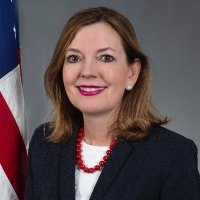The Power of Personal: Women's Leadership and International Exchange
In this conversation, Wilson Center President & CEO Jane Harman and Assistant Secretary of State for Educational & Cultural Affairs Marie Royce discussed soft power’s impact on foreign policy and the bureau’s efforts to empower women to achieve leadership roles both in the public and private sector.
Selected Quotes
Marie Royce:
“We do a tremendous amount of things in the area of educational, cultural, and professional exchanges. But just to see it in the big picture, because we do so much, we say: ‘We move people to move ideas.’ We are the “people” part of the U.S. Department of State. We have 350,000 exchange participants per year.”
“Today, a lot of our focus is on women’s leadership, and also the power of partnerships. Our goal is to continue to build the leadership bench for women in every area…. Last year, we spent $25 million and put out 150,000 women on different programs. So this is very powerful.”
“One of the challenges for the United States, and for the world, I would say, is getting more women to the global workforce. And what we want to do is ensure that women have the skills. We have a new initiative from the White House called the Women’s Global Development and Prosperity Initiative, and this was signed into law in February…. If women just had parity in the workforce, 50 million women would bring $28 trillion to the global economy.”
“I want to share that I believe strongly that I want people to see that what we do is integral to foreign policy. I want people not to think that these programs are just nice to do, but are key to making the world a safer place. These thousands of individuals that come, inbound and outbound, are very much part of our global and national security.”
On Aspen Institute’s J. Christopher Stevens Virtual Exchange Initiative, a program that connects students in the United States with their fellow students in the Middle East and North Africa through virtual technology:
“It represents the future, because I believe we’re getting more and more connected, and having young people use their computers or iPhones, and being connected to other young people, is really a powerful thing.”
“It does have line item [appropriation] from the United States Congress, so we appreciate the fact that there’s a real commitment there. This is a good example of private-public partnerships, where we also even have in-kind contributions of Vimeo, Microsoft, and Twitter…. It’s a great example of leveraging funding together to try and maximize reach of a program.”
Kelly Zug (participated in the Fulbright ETA Program in Bulgaria in 2013):
“Specifically, while working in Ukraine, I realized the marriage of necessity between cultural diplomacy and security, because understanding cultures allows us to foster alliances and international relations. But, also, that security builds that necessary foundation for the longevity of trust and development initiatives in foreign policy.”
Ed Royce, former Representative:
“I think one of the things that’s important is for members of Congress to travel together—to travel together around the world, to learn about the world. And the opportunity for those types of changes, exchanges, are just as important as the types of exchanges for students that we’re talking about here. I would just share that insight for my colleagues. I think it will always be true, and it’s especially important as complex the world is getting today.”
Speakers

